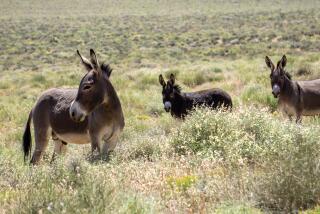Wildlife Sanctuary’s Future Is Endangered
- Share via
THOUSAND OAKS — Enforcement officers from the Ventura County Planning Department are closing in on Deborah Warrick, who has operated a wildlife sanctuary without proper permits for more than four years.
Acting on a complaint from an unidentified resident earlier this year, officials visited the refuge and ordered Warrick to obtain a permit or get rid of her creatures.
“I have until Sept. 30 to get a permit or get out,” Warrick said glumly.
Warrick created her sanctuary nearly five years ago on 18 hilltop acres in the canyons above Thousand Oaks. As the clock winds down, Warrick frets over what could become of her three dozen animals.
“When you take an animal away that has already bonded with someone, you may as well kill it,” she said. “It can’t survive anyplace else.”
She also worries about county wardens coming onto the sanctuary in October and forcibly removing the animals before she finds another site.
“They’ll use catch poles and darts and stuff them into boxes,” Warrick said. “The county doesn’t care what happens to the animals as long as they fulfill their obligation of forcing me to get a use permit.”
Even if Warrick is able to scrape together the permit application fee, Ventura County has imposed conditions that she says are impossible to meet because she rents the land from someone else.
For example, the long dirt road leading to the refuge would need to be paved and water towers installed for fire emergencies. Thousands of dollars in other improvements also are required.
Warrick said she sees herself headed out of business this fall unless she can change the county’s mind or secure another suitable location.
“Just to apply for the permit is an immediate $1,200,” she said. “But to comply is just too expensive. It would cost me $50,000 or $100,000 to meet those conditions.”
Planning officials say applying for a permit is a matter of public safety. A half-dozen other Ventura County residents have managed to meet similar standards and receive a permit for exotic animals, planners said.
“The neighbors should know what’s next door,” said Nicole Doner, a county planner who processes such applications. “If I was a neighbor and had children, I would want to know what’s there.”
Tucked into the folds of the Santa Monica Mountains, not far from the Los Angeles County line, Warrick has been feeding and caring for abused and unwanted exotic animals for nearly five years.
A 3-month-old Bengal tiger cub named Genesis lives inside her house alongside Jamadari, a watchful spotted serval. Outside, a pack of wolves and wolf pups rustle behind fenced cages. A few feet away lies Mufasa, a 10-month old lion. Onyx, a shiny black leopard with steel eyes, and two arctic foxes rescued from a fur farm are close by.
Soul of the Wolf, the nonprofit organization Warrick incorporated a year ago, subsists on donations, magazine sales and $75 “Run with the Wolves” tours she advertises in Los Angeles publications.
Warrick also conducts hands-on classroom presentations for school children throughout Southern California. Earlier this month, she launched a home page on the World Wide Web.
But all of that may cease by the end of September.
Warrick must either persuade her landlord to pave the rugged driveway leading to the mountaintop refuge-and satisfy all of the other conditions needed for an exotic-animals permit-or find another home.
The prospects do not look good. Property owner William Chadwick was not available for comment, and the enforcement officer managing the case said the place is not suitable for such animals.
“I don’t think it’s even going to be possible for her to get that place permitted because it’s not her property,” said Joan Neuhaus, the zoning enforcement officer assigned to the case.
“Can you see a firetruck making its way up there?” she asked.
Chadwick signed a compliance agreement earlier this year that calls for him to obtain all of the necessary permits for the house he rents to Warrick. But he does not need to pave the driveway unless he builds a second house.
Meanwhile, Warrick takes time away from her feedings and cage-cleaning to search for other spots.
There’s an Ojai-area ranch that might be suitable. But permitting there is still a problem. There’s a 60-acre site outside mountainous Frazier Park, but it snows up there and that could be a nuisance.
“All it takes is one person with 20 or more acres in an unincorporated area looking for a tax writeoff,” she said. “I got close once, but the owner gave that property to the Nature Conservancy instead.”
More to Read
Sign up for Essential California
The most important California stories and recommendations in your inbox every morning.
You may occasionally receive promotional content from the Los Angeles Times.













